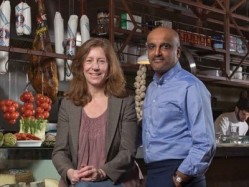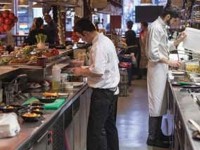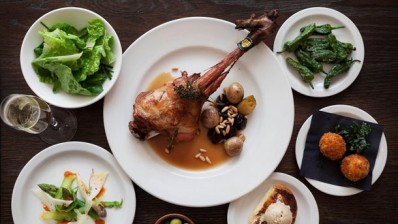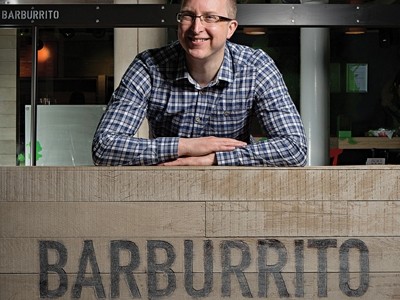Business Profile: Brindisa

London’s current status as one of the best places to eat Spanish food outside Spain can be partly attributed to one woman. She may not be a high profile chef or fawning TV personality, but when Monika Linton founded Spanish wholesaler Brindisa in the late ’80s she arguably kick-started the UK’s current obsession with all things tapas.
After catching the bug for authentic Spanish cuisine in her 20s while teaching English in Barcelona, Linton slowly but surely developed an inventory of top-notch Spanish produce centred around cured foods: cheese, olives, fish and – latterly as export rules were relaxed – charcuterie.
Getting restaurants and shops interested in Spanish products, which at the time weren’t known for their quality, proved difficult. “Everybody thought we were mad. The Spanish restaurants we targeted didn’t think customers would be interested in artisanal products,” recalls Linton, who now operates Brindisa Tapas Kitchens (BTK) – a foursome of successful London restaurants – alongside the wholesale business.
“When we did sell them some Spanish hams, they sold it as Parma ham. It was like the dark ages, we had to create a market for most of our products at the beginning, which was seriously hard work."
Interestingly, BTK doesn’t enjoy discounts on Brindisa products, so its solid financial performance can’t be attributed to big margins.
“BTK is supplied ‘arms length’, which promotes a positive and professional culture between the two groups,” says BTK finance director Ratnesh Bagdai. “We negotiate. BTK is treated like any other customer, although we do get access to exclusive produce and share some of its storage space.”
Linton’s key motivation for becoming a restaurateur was to broaden Brindisa’s market and the understanding of its range. “It’s hard to make your voice heard from a warehouse and you have to rely on other businesses to describe and promote your products. We also wanted to do something that was 100 per cent true to Spain.”
Alongside a consumer-facing online shop, Brindisa – which recently celebrated its 25th birthday – now turns over nearly £10m and operates a retail shop and Brindisa Chorizo Grill (which offers chorizo rolls for a mere £3.75), both in Borough Market.
BTK Restaurants was incorporated in 2003 and opened its first site in Borough Market a year or so later. Linton was introduced to Bagdai – who’d recently left Caprice Holdings as finance director – by regular Brindisa customer Mark Hix, then chef director at Caprice.
“Looking at sites I soon realised that I was out of my depth,” recalls Linton. “I didn’t know much about A3 and I needed someone that was operationally and financially savvy in the sector – a warehouse is very different to a restaurant.”
BTK was one of Bagdai’s first independent projects. His job title might be FD but it soon becomes clear he’s not just pointing out mistakes on the balance sheet, he takes a keen interest in all aspects of the business from the design to the positioning of the menu. His other major concern is Restaurants Etc – the group he founded with Mark Hix in 2008 – which he juggles with fee-based consultancy projects and a successful restaurant accountancy firm.
Bringing Barcelona to Borough
The pair struck gold with the appointment of Jose Pizarro as head chef, now down the road at his brace of highly successful restaurants on Bermondsey Street, and the restaurant was an immediate success. Brindisa was arguably the first UK operator bold enough to bring the hectic, informal charm of the Barcelona tapas bar to London. The inaugural Tapas Brindisa did not take bookings, a brave and unusual move at the time, and people formed an orderly queue to sample its tight, seasonal menu of fresh tapas dishes.
In 2008, BTK opened two new sites: a second Tapas Brindisa in Soho and Casa Brindisa on South Kensington’s Exhibition Road.
“Small bustling bars are a good fit for places where people are in a hurry,” says Linton. “But the South Ken market is obviously vastly different, so we created something more comfortable. Casa Brindisa is much more of a restaurant.”
“There’s no point in forcing a concept on an area if it’s not appropriate,” adds Bagdai, who takes a similar approach at Restaurants Etc, which operates six sites with differentiated offerings under the Hix brand. “Besides, we’re not creating the same thing over and over again. I don’t mind being a brand that stands for great food and great service but we’re not a chain –chains save money by repeating the same formula.”
“Exactly,” adds Linton. “We invest heavily at the beginning to ensure each site is individual and that the chef and other staff have ownership.”
Chefs in particular make their mark, with the tapas and casa menus both featuring regional dishes that correspond with the provenance of the chef. Casa Brindisa is much larger that its fasterpaced siblings and offers a wider menu with some more involved dishes. Spend per head is higher at £30-plus. A major scheme to pedestrianise Exhibition Road has hit the site’s contribution for the past few years but the new outdoor space more than makes up for the disruption.
Ambitious project
Opened late last year, Tramontana is BTK’s most overtly regional and – therefore – most ambitious project to date. In Shoreditch, east London, the restaurant trades from a large site previously home to vegetarian restaurant Saf on Curtain Road. Clearly visible from Old Street, it’s a potentially lucrative but crowded pitch with Busaba Eathai and Byron a mere pintxo stick’s throw.
Tramontana – which represents a total capex in the region of approximately £600,000 – majors on the cooking of the Spanish Mediterranean and takes its name from the wind that billows across from the Alps. “It creates a specific climate which makes for an unusually diverse selection of stunning fresh produce,” says Linton. “As such the area [which stretches down Spain’s eastern coast from the north of Catalonia to the Balearics] has a highly developed cuisine.”
This is reflected on the menu, which majors on Catalan dishes – including trinxat, a dish of white cabbage, potato and bacon; and fideua de sepia, pasta with cuttlefish – and arroces (rice dishes). The latter are cooked to order for a minimum of two people with a 30-minute quoted wait time.
The menu was developed by BTK’s Catalan executive chef Josep Carbonell and Tramontana head chef Nicolas Modad, who is Argentinian but trained under hugely respected Catalan chef Carme Ruscalleda. Fresh produce is sourced from the UK and – in a first for the group – also from Spain, including lesser-known cuts of black Iberian pork and a line-up of sensational vegetables.
Torres and Carbonell’s authentic offering is catnip for food nerds but potentially bewildering for the less adventurous, who should focus on the picoteo section – which includes patatas bravas, croquetas del dia and padron peppers – and Tramontana’s approachable lunchtime specials.
Even more daringly, the wine list is strictly regional making Tramontana a rioja-free zone.
But BTK has judged the Shoreditch market perfectly, its boldness rewarded with a string of glowing reviews and healthy numbers. With the success of Tramontana, and Casa finally set to benefit from the changes to its surroundings, Bagdai is targeting group GM Victor Calvente and operations manager Ruben Maza with a turnover of circa £7.5m for BTK’s next financial year – not too shabby for a four-strong outfit.
BTK eyes Barca restaurant
Linton and Bagdai don’t really do expansion targets but the group remains acquisitive in London, in fact Linton lets slip she’s on the list for property particulars in Brixton, her current home.
“It’s a busy period,” says Linton. “My time is being split between a wholesale business, four restaurants, a Brindisa cookbook project, a husband, two children... and a dog.”
“But we will do something soon,” interjects Bagdai with a jocular eye roll. “We have no debt, the balance sheet is strong and we have the right people in the business to make it work. The momentum is there and if we don’t do something in the next year or so we’ll be letting ourselves down and, more importantly, our senior management team who are hungry for new projects and need progression.”
BTK is also in the late conceptual stages of an overseas project. The company has strong ties with Boqueria – Spain’s premier food market just off Barcelona’s La Rambla – and is planning to open a restaurant nearby. With the current state of the Spanish economy, they’re likely to get a sweet deal.
“Spanish food culture is key to Brindisa,” explains Linton. “We do five trips to Spain for staff per year and a site in Barca would be the focus of that cultural exchange. The connection with the source keeps Brindisa fresh, our chefs and buyers can discover new recipes and ingredients.”
But is there anything left to bring into the UK? “Yes absolutely, dried octopus and salted tuna tripe.” While neither are likely to become the next chorizo, given Linton’s track record it would be unwise to scoff.
This article first appeared in the March issue of Restaurant magazine.






















